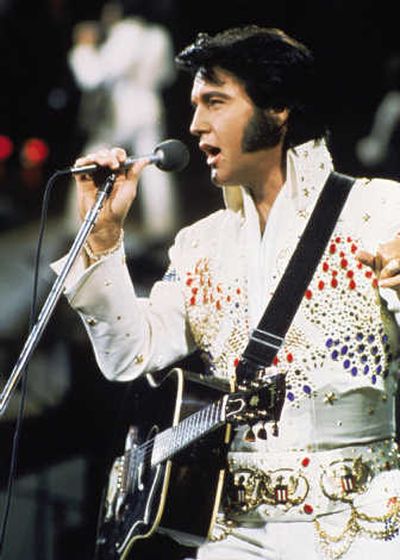Can help falling in love

Elvis Presley has been dead for 30 years and three days now.
It was on Aug. 16, 1977, that his body was found on the bathroom floor of Graceland, his Memphis, Tenn., mansion. And yet he remains a recognizable part of international popular culture.
Despite that fact, here’s a question to consider: How relevant is Presley to the iPod generation?
Chris Kornelis, 25, has a ready answer.
“I’ve never had a conversation about Elvis with anyone my age,” he said.
Kornelis, Web editor for the Seattle Weekly, is a former music correspondent for The Spokesman-Review’s 7 section.
He said if he hears Presley “in a movie or on a soundtrack, you know, I enjoy it. And I can identify Elvis as Elvis. But I don’t think I’ve ever owned an Elvis record.”
And, he added, “I don’t have Elvis on my iPod.”
That Elvis is important to many is glaringly obvious. In terms of his recordings, 149 of Presley’s songs made Billboard’s Top 100 charts; 18 reached No. 1. Fan-club estimates rate his overall record sales at more than 1 billion.
He broke attendance records while performing live in Las Vegas. He acted in 31 movies.
More than 600,000 visitors tour Graceland every year, and no celebrity boasts more professional impersonators.
It takes an expert, though, to put Presley’s iconic status in context.
In 1979, John Bakke, then a professor of communications at the University of Memphis, founded a conference that explored all things Elvis. Over the years, it has attracted the likes of rock critic Greil Marcus and former Presley friend Jerry Schilling.
In a 2006 Web chat that he held for the Department of State, Bakke said, “Presley’s voice was remarkable in the sense that through it he touched people in a way only great artists can do. The people he touched are as diverse as humanity itself and because of that, his popularity has transcended race, class, national boundaries, and culture.”
In a recent phone interview, the 69-year-old Bakke insisted that Presley indeed is still relevant.
“His music continues to be in stores, and people seem to buy it,” he said. “I know my grandchildren, who are 6 and 8 and 10, something like that, recognize him and know some of his songs.”
Memphis Commercial Appeal reporter Michael Lollar, 59, who has written extensively about Presley, echoes Bakke’s sentiments.
In a recent story, he polled a range of critics – from the staff at Rolling Stone magazine to the “American Idol” judges – and discovered that many of them believe Elvis “is probably the No. 1 biggest celebrity of all time, dead or alive.”
But such arguments haven’t necessarily drawn 20-somethings to Presley’s music.
Take Spokane resident Seth Woods, for example.
Woods, 26, graduated from Northwest Christian High School in 1999. He works at Unified Groove Merchants, a new-and-used CD/record store on North Monroe Street.
He says that a few regular customers are always buying Presley records.
“Yeah, we stock Elvis,” Woods said. “We have a good amount of records of his.”
But does he listen to Elvis?
“No,” he said. “I like his old stuff, his Sun Records stuff, I guess. But, no, I don’t like any of the pop music that he made.”
Furthermore, he added, “We don’t get a lot of younger people coming in and buying Elvis records too often.”
Woods may personify a trend. The popular Web-based music download site mp3.com ranked Presley as Wednesday’s 27th-most-popular artist of the day. That placed him between the Beatles and Michael Jackson and behind such contemporary artists as Rihanna, Eminem and Fergie and such older acts as the Backstreet Boys, AC/DC and Celine Dion.
USA Today recently reported that the 30th anniversary of Presley’s death “has not produced the avalanche of album reissues and book tributes of past milestones,” that Kurt Cobain had overtaken him for the top spot on Forbes magazine’s list of highest-earning dead celebrities, and that the top downloaded Elvis song is a remix of “A Little Less Conversation” by the Dutch musician Junkie XL – a tune that, for Presley, “was never more than a modest hit.”
Kornelis, for one, does recognize that the musicians he has on his iPod – among them Jackson, Beck and The Black Crowes – might have a different view of Presley.
“I’m sure that the people I listen to really have more of an appreciation for him, or definitely been influenced by him,” Kornelis said. “You know, his style and his songwriting and just everything about him.”
Still, he sees only one way in which Elvis Presley has been even remotely important to him personally.
“I make a modified Elvis sandwich, as I call it,” he said. “Except I just do peanut butter and jelly and bacon.”
Presley’s trademark sandwich was, of course, bananas and peanut butter grilled in butter.
Doesn’t Kornelis even follow the grilled-in-butter part of the recipe?
“No, I don’t,” he said. “I need to do that, though.”